Related Research Articles

Algeria, officially the People's Democratic Republic of Algeria, is a country in the Maghreb region of North Africa. It is the largest country by total area in Africa and in the Arab world. It is bordered to the northeast by Tunisia; to the east by Libya; to the southeast by Niger; to the southwest by Mali, Mauritania, and Western Sahara; to the west by Morocco; and to the north by the Mediterranean Sea. The country has a semi-arid geography, with most of the population living in the fertile north and the Sahara dominating the geography of the south. Algeria covers an area of 2,381,741 square kilometres (919,595 sq mi), making it the world's tenth largest nation by area. With a population of 44 million, Algeria is the ninth-most populous country in Africa, and the 32nd-most populous country in the world. The capital and largest city is Algiers, located in the far north on the Mediterranean coast.

Morocco, officially the Kingdom of Morocco, is the northwesternmost country in the Maghreb region of North Africa. It overlooks the Mediterranean Sea to the north and the Atlantic Ocean to the west, and has land borders with Algeria to the east, and the disputed territory of Western Sahara to the south. Morocco also claims the Spanish exclaves of Ceuta, Melilla and Peñón de Vélez de la Gomera, and several small Spanish-controlled islands off its coast. It spans an area of 446,550 km2 (172,410 sq mi) or 710,850 km2 (274,460 sq mi), with a population of roughly 37 million. Its official and predominant religion is Islam, and the official languages are Arabic and Berber; the Moroccan dialect of Arabic and French are also widely spoken. Moroccan identity and culture is a vibrant mix of Berber, Arab, and European cultures. Its capital is Rabat, while its largest city is Casablanca.

This article is about the demographic features of the population of Algeria, including population density, ethnicity, education level, health of the populace, economic status, religious affiliations and other aspects of the population.
The Pieds-Noirs, singular Pied-Noir, are the people of French and other European origin who were born in Algeria during the period of French rule from 1830 to 1962, the vast majority of whom departed for mainland France or Corsica as soon as Algeria gained independence, or in the months following.

Ahmed Ben Messali Hadj, commonly known as Messali Hadj, Arabic: مصالي الحاج, was an Algerian nationalist politician dedicated to the independence of his homeland from French colonial rule. He is often called the "father" of Algerian nationalism.
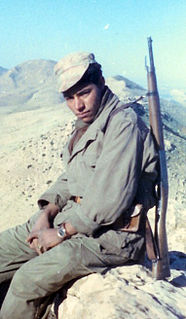
Harki is the generic term for native Muslim Algerians who served as auxiliaries in the French Army during the Algerian War of Independence from 1954 to 1962. The word sometimes applies to all Algerian Muslims who supported French Algeria during the war. The motives for enlisting in the Harkis were mixed. They are regarded as traitors in Algeria and thousands were killed after the war in reprisals despite the Évian Accords ceasefire and amnesty stipulations.

The Popular Movement is a royalist and traditionalist rural-focused political party in Morocco. It is a member of Liberal International. The party has a history of cooperating with two other parties with a liberal orientation, the National Rally of Independents and the Constitutional Union, since 1993.
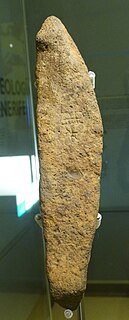
The Zenata are a group of Amazigh (Berber) tribes, historically one of the largest Berber confederations along with the Sanhaja and Masmuda. Their lifestyle was either nomadic or semi-nomadic. They were famous for their horse riding ability to the point that in Spanish Jinete a version of their name became equated with mastery of the skill.
Andalusī nūbah, also transliterated nūba, nūbā, or nouba, or in its classical Arabic form, nawba, nawbah, or nōbah, is a music genre found in the North African Maghrib states of Morocco, Algeria, Tunisia, and Libya but, as the name indicates, it has its origins in Andalusi music. The name replaced the older use of sawt and originated from the musician waiting behind a curtain to be told it was his turn or nawbah by the sattar or curtain man.
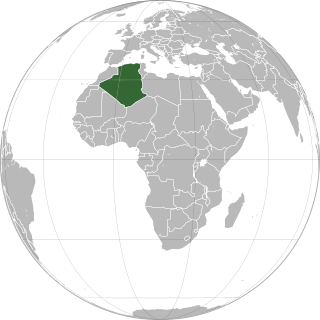
The History of the Jews in Algeria refers to the history of the Jewish community of Algeria, which dates to the 1st century CE. In the 15th century, many Spanish Jews fled to the Maghreb, including today's Algeria, following expulsion from Spain and Portugal; among them were respected Jewish scholars, including Isaac ben Sheshet (Ribash) and Simeon ben Zemah Duran (Rashbatz).

Fatima-Zohra Imalayen, known by her pen name Assia Djebar, was an Algerian novelist, translator and filmmaker. Most of her works deal with obstacles faced by women, and she is noted for her feminist stance. She is "frequently associated with women's writing movements, her novels are clearly focused on the creation of a genealogy of Algerian women, and her political stance is virulently anti-patriarchal as much as it is anti-colonial." Djebar is considered to be one of North Africa's pre-eminent and most influential writers. She was elected to the Académie française on 16 June 2005, the first writer from the Maghreb to achieve such recognition. For the entire body of her work she was awarded the 1996 Neustadt International Prize for Literature. She was often named as a contender for the Nobel Prize for Literature.
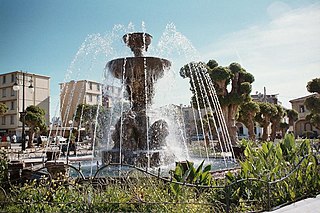
Cherchell is a town on Algeria's Mediterranean coast, 89 kilometers (55 mi) west of Algiers. It is the seat of Cherchell District in Tipaza Province. Under the names Iol and Caesarea, it was formerly a Roman colony and the capital of the kingdoms of Numidia and Mauretania.

The Regency of Algiers was a state in North Africa lasting from 1516 to 1830, until it was conquered by the French. Situated between the regency of Tunis in the east, the Sultanate of Morocco in the west and Tuat as well as the country south of In Salah in the south, the Regency originally extended its borders from La Calle in the east to Trara in the west and from Algiers to Biskra, and afterwards spread to the present eastern and western borders of Algeria.
The Shabiba Islamiya was a violent and clandestine Moroccan extremist Islamist group founded in 1969 by Abdelkrim Motii and Kamal Ibrahim. Its goal was the establishment of an Islamic state in Morocco. The group was active until 1985, due to a government crackdown.
The Turks in Algeria, also commonly referred to as Algerian Turks, Algerian-TurkishAlgero-Turkish and Turkish-Algerians are ethnic Turkish descendants who, alongside the Arabs and Berbers, constitute an admixture to Algeria's population. During Ottoman rule, Turkish settlers began to migrate to the region predominately from Anatolia. A significant number of Turks intermarried with the native population, and the male offspring of these marriages were referred to as Kouloughlis due to their mixed Turkish and central Maghrebi heritage. However, in general, intermarriage was discouraged, in order to preserve the "Turkishness" of the community. Consequently, the terms "Turks" and "Kouloughlis" have traditionally been used to distinguish between those of full and partial Turkish ancestry.
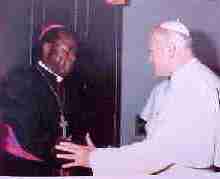
Albert Ndongmo was Bishop of Nkongsamba in Cameroon between June 1964 and January 1973. In 1970 he was arrested, accused of treasonous dealings with rebels, and sentenced to death by a military tribunal. His sentence was later commuted to life imprisonment, of which he served five years before the President ordered his release. After being released he moved to Rome and then to Canada, where he spent the rest of his life.

The Paris metropolitan area has a large Maghrebi population, in part as a result of French colonial ties to that region. As of 2012 the majority of those of African origin living in Paris come from the Maghreb, including Algeria, Morocco, and Tunisia. There were 30,000 people with Algerian nationality, 21,000 persons with Moroccan nationality, and 15,000 persons with Tunisian nationality in the city of Paris in 2009. In addition, there were thousands of Maghrebi Jews who fled the Maghreb as a consequence of the post-World War II Jewish exodus from Arab and Muslim countries.
Myriam Ben (1928–2001) was an Algerian activist, militant, novelist, poet, and painter. She was born Marylise Ben Haïm in Algiers on October 10, 1928.
References
- ↑ Wimelius, Malin (2003), On Islamism and Modernity: Analysing Islamist Ideas on and Visions of the Islamic State, Umea University, p. 213, ISBN 9173054615 .
- ↑ Pargeter, Alison (2008), The New Frontiers of Jihad: Radical Islam in Europe, University of Pennsylvania Press, p. 79, ISBN 0812241460 .
- ↑ Funke, Nikki; Solomon, Hussein (2008), Exploring Islamic Fundamentalist Ideologies in Africa, Africa Institute of South Africa, p. 222, ISBN 0798301988 .
- ↑ Denaud, Patrick (1998), Algerie: Le Fis: Sa direction parle, L'Harmattan, p. 30, ISBN 2296355137 .